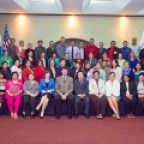You are here
Together, we can! Strengthening the capacity of multi-disciplinary teams within the Guatemalan child protection workforce

Contributed by Kelley Bunkers, formerly a child protection consultant and currently Child Protection and Welfare Systems Technical Director at 4Children and member of the Global Social Service Workforce Alliance
 I joined with Jini Roby (Professor of Social Work at Brigham Young University) to develop two training modules for Buckner Guatemala. The trainings were launched in June 2015 with two sessions of two-day trainings to highlight the important role of multi-disciplinary teams, such as social workers, psychologists and pedagogues, within the Guatemalan child protection system in general and the court system specifically. We traveled to Guatemala City, Guatemala, to hold these trainings from June 8-12, 2015, which were hosted by Buckner Guatemala, with support from the Displaced Children and Orphans Fund (DCOF) and the Guatemalan Court System.
I joined with Jini Roby (Professor of Social Work at Brigham Young University) to develop two training modules for Buckner Guatemala. The trainings were launched in June 2015 with two sessions of two-day trainings to highlight the important role of multi-disciplinary teams, such as social workers, psychologists and pedagogues, within the Guatemalan child protection system in general and the court system specifically. We traveled to Guatemala City, Guatemala, to hold these trainings from June 8-12, 2015, which were hosted by Buckner Guatemala, with support from the Displaced Children and Orphans Fund (DCOF) and the Guatemalan Court System.
The two modules, jointly developed by Buckner Guatemala’s “Semillas de Esperanza” (Fostering Hope Guatemala) project and the Guatemalan School of Judicial Studies were titled: Values, Knowledge and Interpersonal Skills for Child Protection and Alternative Care. Jini and I contributed to the development of the modules in a participatory process that was informed and reviewed by a multi-disciplinary team of experts representing Guatemalan child welfare government bodies, academic institutions and representatives from child-focused organizations.
The June training was officially launched by Fostering Hope Guatemala a Project of Buckner and the Guatemalan Judicial System and included key note speeches from the Chilean Ambassador to Guatemala, Ambassador Domingo Namuncura. The participation of Ambassador Namuncura was particularly relevant given that he is a trained social worker and he has contributed significant work in human rights related efforts within Chile. The presentations by guest speakers and the content of the two training modules we presented focused on the values and skills of the multi-disciplinary team including the important role of coordination between the legal and the psychosocial sectors in providing a holistic response to children. Participants shared interesting real life examples from Chile and Guatemala, which illustrated how the child protection system continues to be strengthened in these countries. We also divided participants into small groups to interact and raise questions. Participants agreed that these sessions provided useful opportunities for them to reflect and discuss the training content.
The module on alternative care proved to be especially interesting to participants given the important role that multi-disciplinary teams have in the assessment, referral, case management and follow up procedures involved in the decision making process of alternative care. Participants were particularly interested in learning more about the evidence base related to both residential and family based care. Very few participants were familiar with the Guidelines on Alternative Care of Children so the information provided was especially relevant. Participants also suggested that Guatemala develop its own National Guidelines for Alternative Care to ensure that they were contextually appropriate and informed by real life experiences of children and families.
I engaged with participants in lively discussions around this issue. They developed concrete ideas about how they could take the information learned in the training and incorporate it into their daily work. Examples included sharing information on the detrimental effects of residential care on children’s development with judges to help influence and inform their decisions related to alternative care. Participants also stressed the need to improve linkages with local service providers to strengthen community based family strengthening services that aim to prevent separation and eventual placement in residential care.
Pre-service and in-service trainings remain an important aspect of the training multi-disciplinary teams receive, including social workers. UNESCO data from 2013 shows that 293,721 students in Guatemala are engaged in higher education; approximately 5,000 of those are studying social work.
Abigail Alvarez Och, a Professor of Social Work at a university in Guatemala City, shared with me that many of her students have chosen their career path because they come from very humble backgrounds and can easily relate to the personal experiences of many of their clients. She has spent the past 24 years working in the social service sector. Now the Director of Gender and Ethnic Equality within the Presidential Secretariat for Planning and Programming, she was involved in the recent drafting of the National Plan of Action for Development K’atun Nuestra Guatemala 2032. The plan is centered on human development and finding the means to guarantee the participation and fulfillment of rights of Guatemalan citizens, including children. “I utilized a lot of my social work background and theory to inform the drafting of this important document,” she said.
The training modules we developed were officially endorsed by the Guatemala School of Judicial Studies (GSJS) in a formal ceremony attended by government representatives from both Guatemala and the United States. I was excited to learn that the training will also be mandatory pre-service training for all new social workers, pedagogues and psychologists and required in-service training for existing staff of multi-disciplinary teams. The GSJS will offer the training utilizing the trainer’s guide that we developed together with the student manual. Both manuals, Manual del Docente and Manual del Estudiante, are now available publicly, in Spanish. As Guatemala continues to strengthen its social service workforce across all sectors, the skills developed through these trainings will be invaluable toward advancing child protection, alternative care and psychosocial support.
